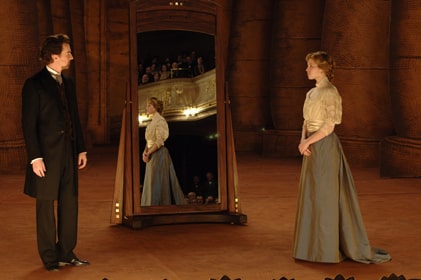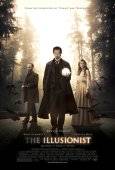Eye For Film >> Movies >> The Illusionist (2006) Film Review

Another stage-magicians story so soon after The Prestige needs something to distinguish itself with, and The Illusionist fares quite well.
In keeping with the theme, The Illusionist is visually impressive from the opening credits, sweeping us into intricate scrolls and patterns that lead us through soft focus shots of rich landscapes, book-lined offices and the delicately distinguished architecture of Vienna's streets a hundred years ago. Browns, sepias and ochres suffuse the screen, seducing us into a world of chimaeras and fairy-tale reality masterminded by quiet and unassuming Eisenheim the Illusionist (Edward Norton).

This is a romantic mystery around a brilliant stage magician of yesteryear, determined to win back his childhood sweetheart from a corrupt and dangerous Prince. Through flashback, we see Sophie, a child of the gentry. Eisenheim, on the other hand, is a lowly son of a cabinet-maker. Where The Prestige toyed with magicians seeking ultimate magic through fringe science of the day, The Illusionist has an air of fantasy where amazing powers are never questioned. The main protagonists have a Hansel-and-Gretel innocence against a big bad tyrant.
Says director Neil Burger, "Most of the tricks are based on real illusions," but, even though based on tricks of the period, they are rather stunning on screen, due in no small part to the very powerful, almost hypnotic presence exerted by Edward Norton. But at one point early on, it seemed to be getting a bit too Harry Potter. Burger says, "If you're going to exaggerate certain elements, to have it be dreamlike or surreal or uncanny, you have to make sure that the rest of it has a rock solid foundation in the period." The film is so smoothly delivered that it seems pointless worrying about how exaggerated they were. "My goal was to have the film completely inhabit that realm of dream and mystery," he says, and succeeds.
Jessica Biel, as Sophie, also gives a strong melt-in-the-mouth performance. Paul Giamatti, as the doggedly persevering police chief, torn between conscience and following crooked orders, shows a strength in his performance that contrasts well with bumbling characters of earlier films (such as Sideways). Norton is tender and caring - again a revelation testifying to a breadth of very considerable acting skills.
The film competed against The Prestige for Best Cinematography Oscar, and has a very distinctive look, based on an early colour photography process called 'autochrome'. Philip Glass, one of the most important contemporary composers and well respected for his film scores, seamlessly maintains the flow of the movie (even if it does sound disturbingly similar to his score for The Hours). But the consummate production values and perfectly combined talent going into The Illusionist is also its weakest point. Where The Prestige hit an unsettling nerve by keeping the audience unsure of the plot development, The Illusionist, appealing to a wider market, is engaging but controlled. The surprise ending is icing on the cake of a sumptuously professional piece of entertainment. Elegant and mesmerising, skilfully saturated with stylish energy, a tale of forbidden love that will delight as an intelligent date movie or as family entertainment. Production line it might be, but top of the range. Or so we are meant to believe.
Reviewed on: 19 Mar 2007




















